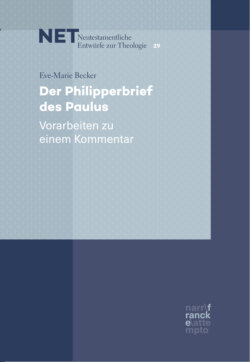Читать книгу Der Philipperbrief des Paulus - Eve-Marie Becker - Страница 29
На сайте Литреса книга снята с продажи.
4. Paul’s explosure of the human selfSelbst, self, selfhood
ОглавлениеIn contrast to modern anthropology and ethics, Paul’s treatment of “anxiety” and “care” is not systematic. And although – as E. A. JudgeJudge, E. A. claims – social “behaviour and training people in it was a major interest Paul shared with the popular philosophers,”Judge, E. A.1 Paul does not develop a consistent training program or a comprehensive anthropological or ethical concept. However, by reflecting on human “anxiety” and “care,” i.e. μέριμναμέριμνα, μεριμνάω, Paul not only takes the conditio humana seriously, he also develops ethical discourse in the direction of individual decision-makingDecision-making. As a communal body, the ecclesia finally consists of the moral integrity of individuals. Since the community as such should imitate Paul, the apostle proposes existential “anxiety” and “care” as individual tools to face temporality and prove oneself in an ethical sense.
By shaping the pattern of individual “anxiety” and “care,” Paul thus surpasses the purpose of communal ethics: he finally explores the human Self. In doing so, Paul even prepares for some modern thoughts of individual ethics. “AnxietySorge” and “care” appear to be individual habits of Pauline anthropology and ethics. In the end, they connect Paul with modern philosophy, or perhaps more accurately, they connect modern philosophy with Paul. For this reason, I will conclude by suggesting that we apply to Pauline exegesis what Harold BloomBloom, Harold once said about the field of literary theory: He favors “a Shakespearean reading of Freud … over a Freudian reading of Shakespeare.”Bloom, HaroldSorge2 The same could be said about Paul and modern philosophers. Since Paul anticipates central ideas of individual anthropology and ethics, I dare to say that I favor a Pauline reading of philosophy over a philosophical reading of Paul.
